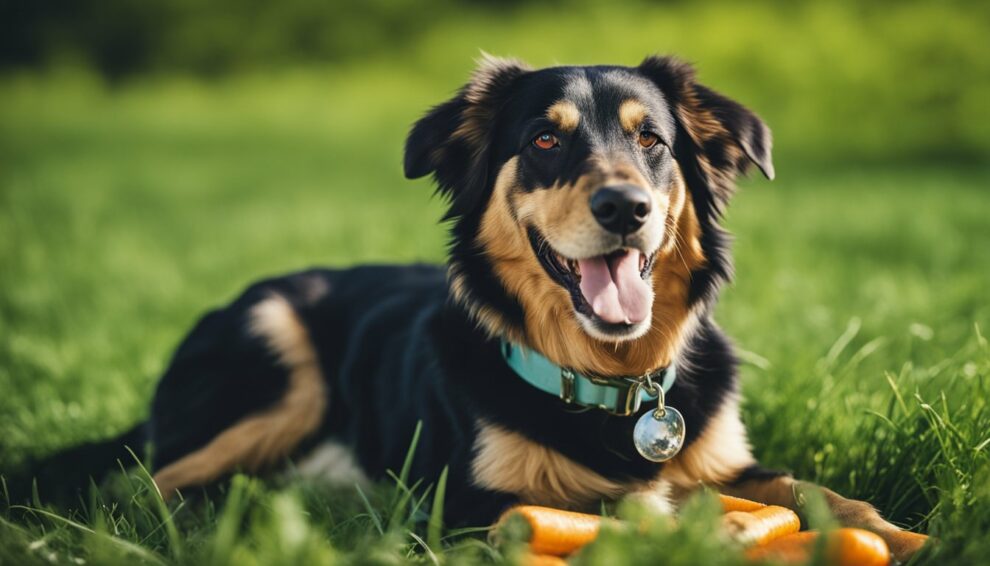As dog owners, we always want the best for our furry friends, and that includes their diet.
Raw carrots are a fantastic addition to your dog’s nutrition plan.
Not only do they provide a low-calorie snack, but they’re also packed with essential vitamins and minerals that support overall health.
Feeding our dogs raw carrots can be a refreshing treat, especially on a hot day, and it’s a healthy alternative to processed dog treats.
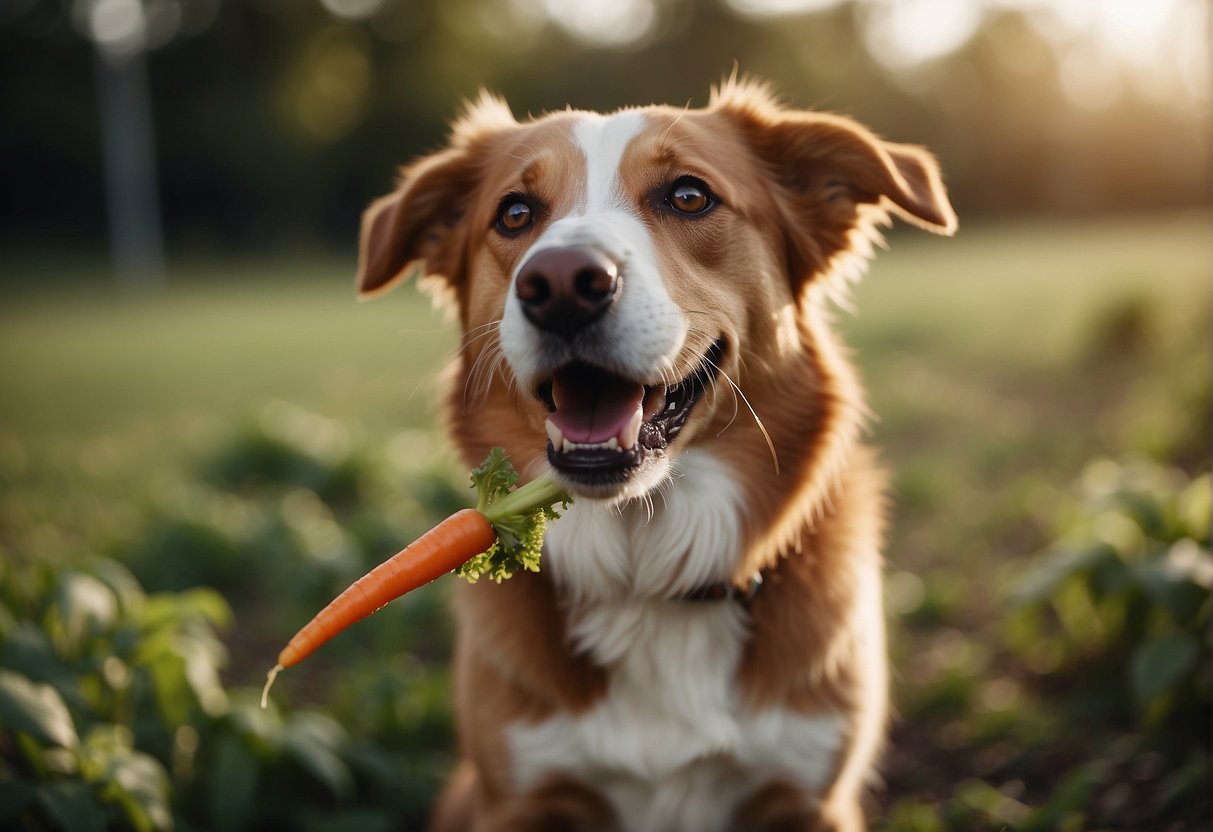
When we incorporate raw carrots into our dogs’ diet, we’re also supporting their dental health.
The crunchy texture of raw carrots can help clean our dogs’ teeth and promote better oral hygiene.
Moreover, the fiber content in carrots aids in digestion, contributing to a healthy digestive system.
Knowing that we’re providing a treat that is as nutritious as it is delicious for our dogs gives us peace of mind.
Raw carrots are more than just a simple snack; they’re a beneficial component of our dogs’ well-being, offering a range of health advantages from improved vision to a stronger immune system.
Plus, it’s a joy to watch our dogs crunch happily on this wholesome veggie!
How Carrots Benefit Your Dog’s Health
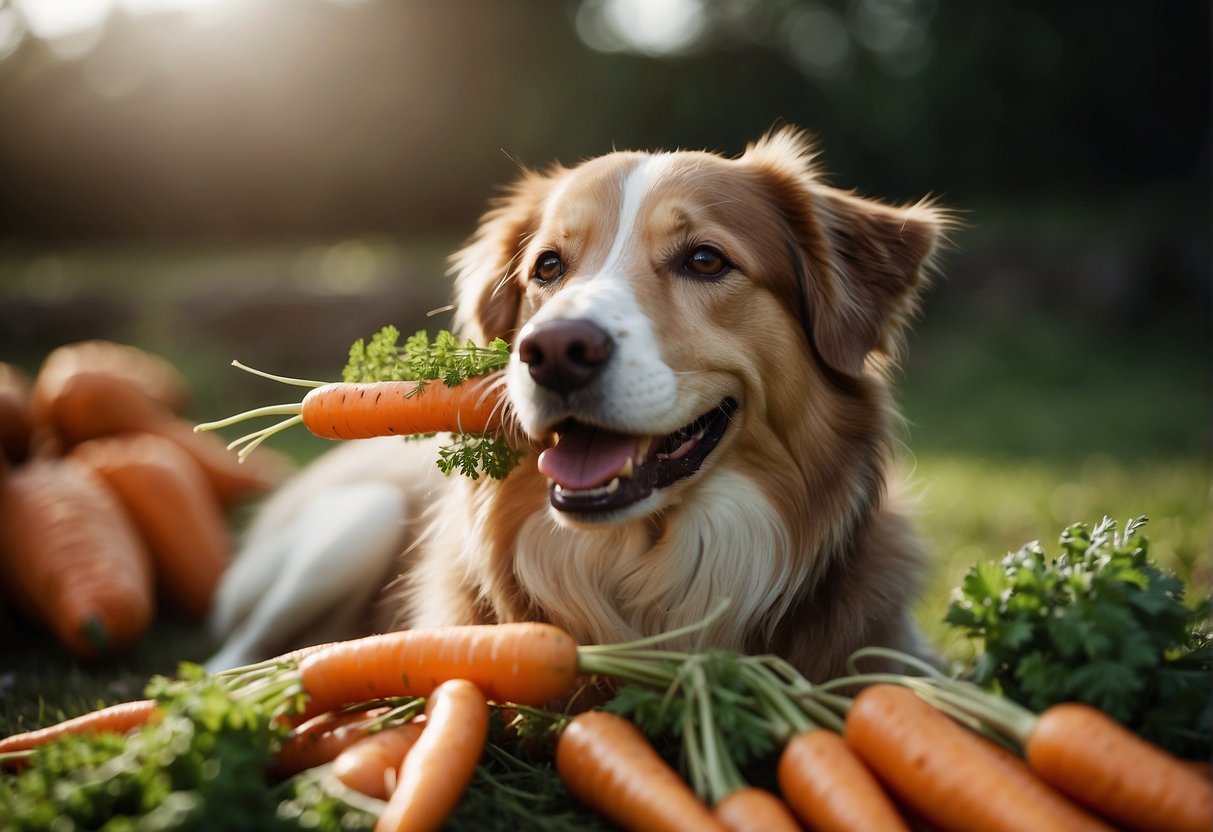
We’ve all heard that carrots are good for us, but they’re also fantastic for our furry friends.
Packed with essential nutrients and health benefits, incorporating carrots into our dog’s diet is a wise choice for their overall well-being.
Nutritional Breakdown of Carrots
Carrots are a powerhouse of nutrients beneficial for your dog.
They are loaded with vitamin A, which is crucial for maintaining good vision, immune function, and skin and coat health.
Moreover, carrots are a great source of dietary fiber which aids in digestive health.
They are also rich in vitamins like C and K and provide minerals such as potassium and manganese, as well as antioxidants that help in combating free radicals.
Promoting Dental Health
When our dogs munch on raw carrots, they get a natural teeth-cleaning session.
Carrots can help scrub away plaque, promoting dental health.
This crunchy vegetable also massages their gums and can freshen up doggy breath.
Who knew that something as simple as a carrot stick could do so much for keeping those pearly whites in good shape?
Supporting Digestive Wellness
Carrots are an excellent source of fiber, which is a boon for your dog’s digestive system.
Fiber helps to add bulk to the stool and supports regular bowel movements.
The dietary fiber in carrots can also aid in soothing an upset stomach and may help prevent issues like constipation.
Enhancing Skin and Coat Condition
The benefits of vitamin A and antioxidants found in carrots extend to promoting healthy skin and a shiny coat.
A healthy diet including carrots can lead to a noticeable improvement in your dog’s skin condition, reducing dryness and keeping their fur soft and vibrant.
A well-nourished coat is one of the outward signs of great internal health.
Remember, while carrots are beneficial, they should be given in moderation as part of a balanced diet.
Always consult with your vet to determine the best diet for your dog’s specific needs.
The Safety of Feeding Dogs Carrots
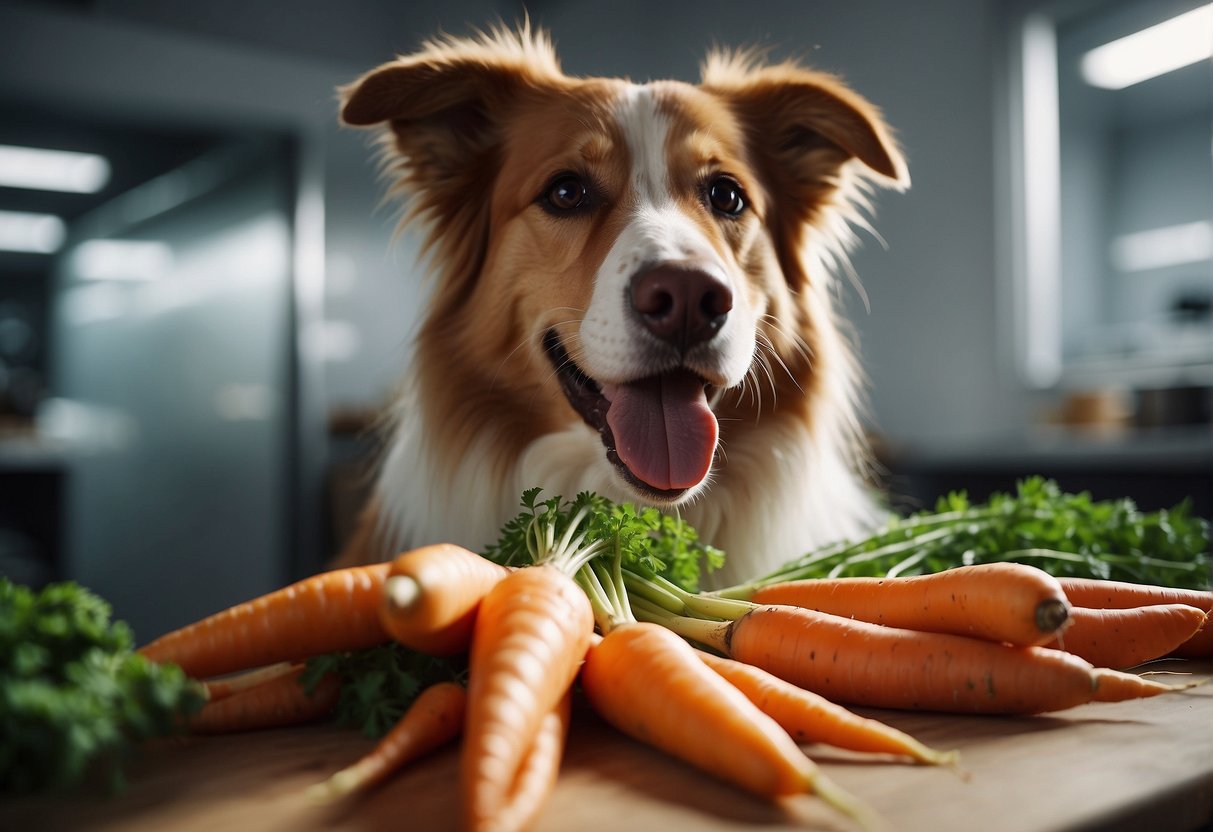
Before we introduce raw carrots to our dogs’ diets, it’s essential to consider the safety aspect.
Ensuring they’re a safe treat involves being aware of potential choking hazards, understanding proper portion sizes, and when in doubt, consulting with a veterinarian.
Choking Risks and Precautions
When it comes to chewing carrots, the risk of choking is something we can’t ignore, especially for smaller dogs or those that tend to gulp their food.
To minimize this risk, we should cut the carrots into bite-sized pieces.
For an extra layer of caution, consider starting with small bits that encourage chewing and make it easier for your dog to handle.
It’s also crucial to supervise our furry friends while they’re enjoying this crunchy treat.
- Precautions:
- Cut carrots into small, manageable pieces.
- Supervise your dogs while they eat.
- Introduce carrots slowly to observe how they chew.
Appropriate Portion Sizes
Moderation is key when feeding our dogs anything new, and that includes carrots.
Too much of a good thing can still be an issue—carrots should only be a supplement to their diet.
We want to make sure we’re not overdoing it.
A few small pieces of carrot can be a healthy addition, but let’s not replace a significant portion of their regular diet with these crunchy snacks.
- Portion Guidelines:
- Small dogs: 1-2 small pieces of carrot
- Medium dogs: 2-3 medium pieces of carrot
- Large dogs: 3-4 larger pieces or a whole carrot
Consulting with a Veterinarian
Lastly, we should always touch base with our vet before making any changes to our dogs’ diets.
They can provide personalized advice on whether carrots are a safe option for our specific dog, taking into account their health, size, and any unique dietary needs.
If our vet gives the green light, they can also help us understand the perfect serving size.
- Vet Checklist:
- Discuss individual dietary needs.
- Confirm carrots are safe for your dog.
- Get guidance on serving sizes.
Raw Vs. Cooked Carrots for Dogs
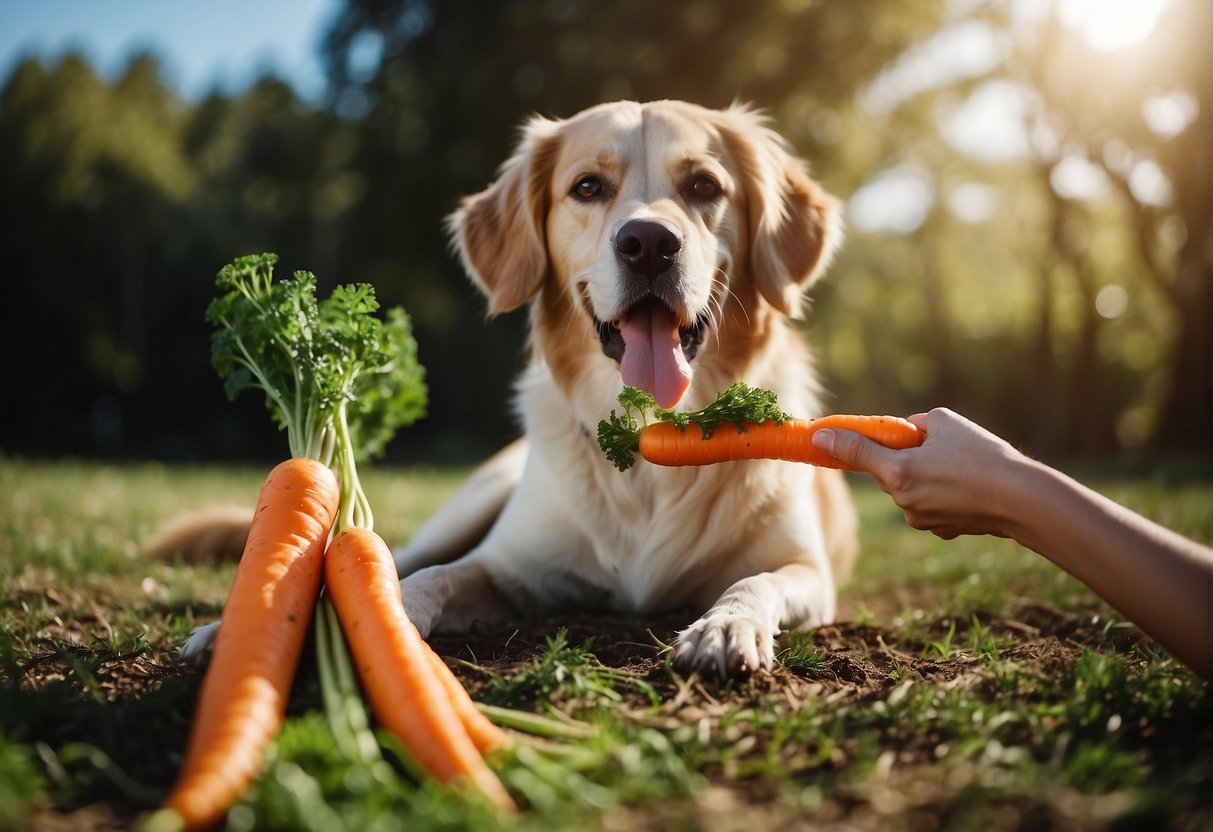
In considering the best way to serve carrots to our furry friends, it’s essential to understand how different preparations affect their nutritional value.
We’ll explore the advantages of raw, cooked, and even frozen carrots for dogs.
Benefits of Raw Carrots
Raw carrots are a crunchy, low-calorie snack that provide a good source of fiber and vitamins.
They offer a satisfying chew that can help maintain healthy teeth, and are packed with nutrients that are beneficial for our dog’s vision and immune system.
The fiber in raw carrots also aids in digestive health, which can be particularly helpful for dogs that need help with regularity.
- Nutrients Preserved: No nutrients are lost to cooking processes.
- Dental Health: Chewing can help scrape away plaque.
Benefits of Cooked Carrots
When we cook carrots, we can enhance their digestibility, allowing our dogs to absorb more of the valuable vitamins and antioxidants.
Cooking methods like boiling or baking can break down the tough cellular walls of carrots, making it easier for dogs to digest them.
However, it’s important to avoid adding any harmful seasonings or sugar.
Cooked carrots can be gentler on a dog’s stomach, especially if they have a sensitive digestive system.
- Digestibility: Soft texture makes cooked carrots easier on digestion.
- Flavor: Cooking might bring out the natural sweetness that many dogs love.
When to Choose Frozen Carrots
Frozen carrots can be a refreshing treat for our dogs, especially on a hot day, and they retain most of the nutrients found in raw carrots.
They can provide the same dental benefits as raw carrots, helping to keep our dog’s teeth clean between brushings.
It’s important to thaw the carrots slightly to ensure they’re not too hard for our dogs to chew to avoid any potential choking hazard.
- Refreshing Treat: Great for cooling down during warmer weather.
- Convenient: Easy to store and serve as needed without prep time.
Carrots as Part of a Balanced Diet for Dogs
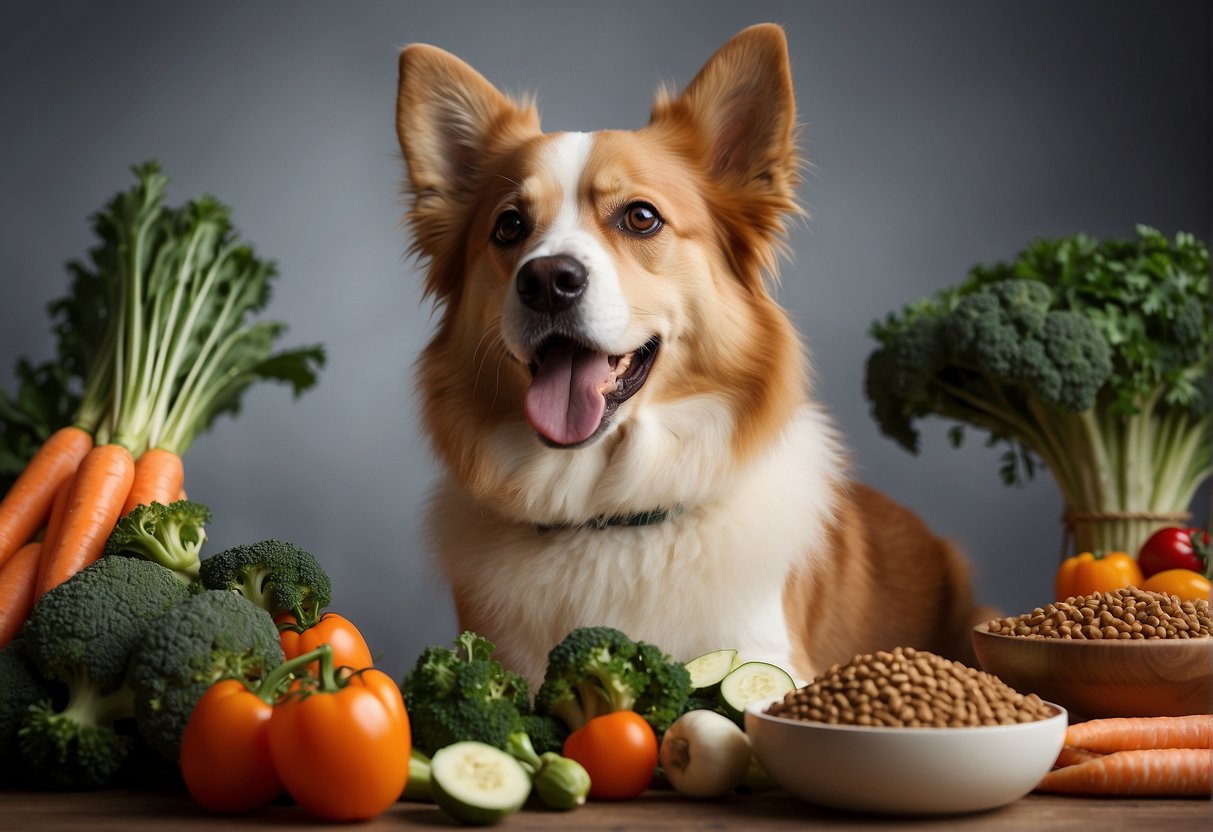
When we consider the dietary needs of our canine companions, it’s essential to ensure that any fruits and vegetables, including carrots, complement their core requirements for protein, fat, and carbohydrates.
Carrots are an excellent addition to a balanced diet for dogs, providing nutritional value without excess calories that might lead to weight gain.
Incorporating Carrots with Other Vegetables
Carrots are a crunchy, nutritious option that can be safely combined with other vegetables.
They are high in fiber and beta-carotene, which is beneficial for a dog’s vision, skin health, and overall immune system.
When adding carrots to a dog’s diet, we must consider the nutritional value they offer:
- Low Calories: Helps maintain a healthy weight
- High Fiber: Contributes to good digestive health
- Vitamin A: Vital for eye health and immunity
To maintain balance, we can include vegetables like green beans and spinach, which are low in calories too and provide an array of nutrients.
Always avoid onions and garlic, which are toxic to dogs.
Avoiding Foods That Are Harmful to Dogs
While exploring human foods that can be shared with pets, we must avoid anything toxic to dogs.
For example, grapes, raisins, chocolate, and xylitol (found in sugar-free products) can be incredibly harmful.
Checking with a vet is crucial before introducing new foods into a dog’s diet to confirm they are safe and will not interfere with the dog’s nutritional needs.
Creating a Nutritional Meal Plan
A well-rounded meal plan for our dogs should predominantly consist of high-quality protein while incorporating suitable vegetables and fruits to provide essential vitamins and minerals.
Here’s a basic framework for understanding a balanced meal plan:
- Protein: Should be the majority of the meal.
- Vegetables: A variety of safe veggies (including carrots) to complement the meal.
- Fats: Necessary for energy, but in moderation.
- Carbohydrates: Usually obtained from the vegetables and some grains.
We must ensure the meal plan is tailored to our dog’s caloric needs, which helps prevent obesity, and keep regular appointments with the vet to adjust the diet based on our pet’s specific health requirements.
Fun Ways to Serve Carrots to Your Canine Companion
Introducing fresh and zesty carrots in fun ways can keep our pups happy and healthy.
Let’s explore some enjoyable methods to offer this crunchy veggie to our furry friends.
Using Carrots as a Training Reward
Carrots can be a nutritious and low-calorie reward during training sessions.
Chopping them into bite-sized pieces makes for a perfect, quick snack that can encourage our dogs through positive reinforcement.
Be sure to offer them in moderation to maintain a balanced diet.
Creating Homemade Carrot Dog Treats
Homemade treats made with carrots not only add variety but also pack a punch with nutrition.
By baking carrot slices into treats or mixing grated carrots with other dog-friendly ingredients, we can create wholesome snacks that they’ll wait eagerly for.
Interactive Feeding Toys and Carrots
Slotting frozen carrots into chew toys can provide a playful and satisfying challenge.
It keeps our dogs entertained for hours as they figure out how to get to their carrot delight and also helps soothe teething puppies.
Plus, the frozen aspect makes it a refreshing occasional treat for those warm days.







